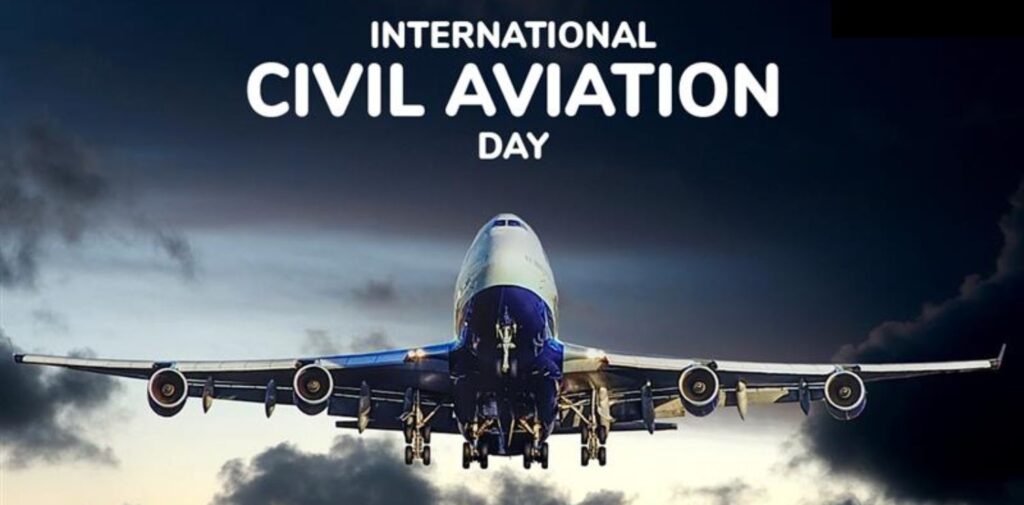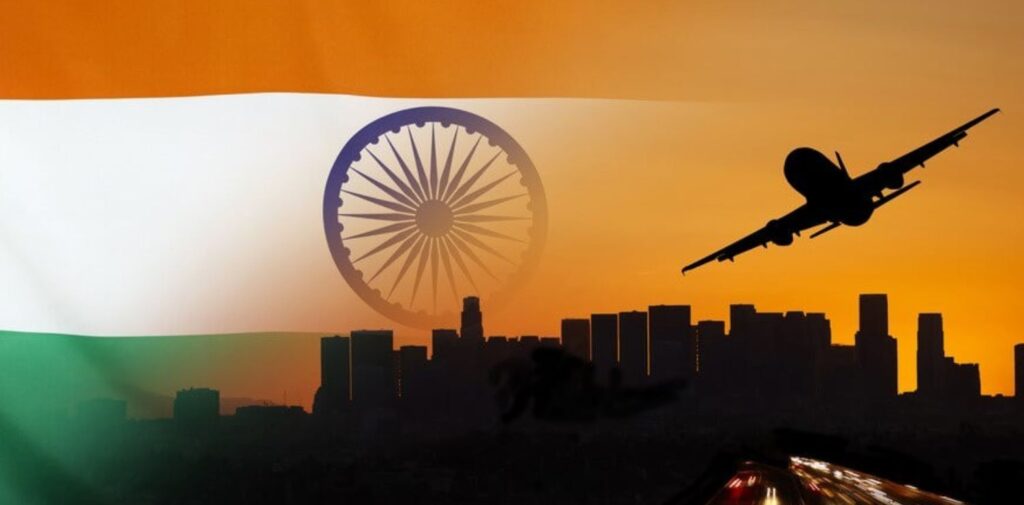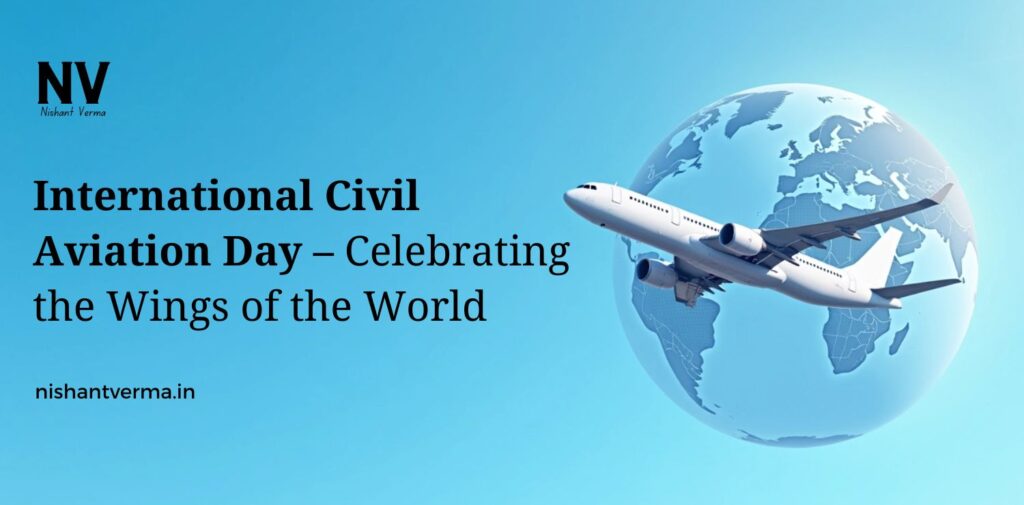Every year, on 7th December, the world celebrates International Civil Aviation Day. This special day is dedicated to honoring the global significance of civil aviation and the important role it plays in connecting people, cultures, and economies. Aviation has made the world smaller, helping people travel across continents in just a matter of hours. International Civil Aviation Day reminds us of how vital this industry is to the global community.
For countries like India, with its rapidly growing aviation sector, this day holds even greater importance. From the development of airports and airlines to the increasing number of air passengers, civil aviation is one of the key drivers of economic growth in India.
In this article, we will explore the history, significance, and impact of International Civil Aviation Day, with a special focus on India’s role in the global aviation industry.
What is International Civil Aviation Day?
International Civil Aviation Day is observed to raise awareness about the contributions of civil aviation to the global society. The United Nations (UN) established the day in 1994, marking the 50th anniversary of the creation of the International Civil Aviation Organization (ICAO), a specialized agency of the UN. ICAO was created in 1944 to promote the safe and orderly development of international civil aviation.
The purpose of the day is to highlight the importance of civil aviation in today’s world, where it plays a major role in global trade, tourism, cultural exchange, and international cooperation. The day is celebrated around the world with various events, conferences, and discussions about the achievements and challenges in civil aviation.
The theme for International Civil Aviation Day varies each year, but the core message remains the same: to emphasize the importance of air travel in connecting the world and promoting peace, progress, and prosperity.

The Role of Civil Aviation in India
India, the world’s most populous democracy, has long recognized the significance of aviation in shaping its future. With its massive population, growing middle class, and vast geographical expanse, air travel has become the backbone of mobility within the country. India has a rich history in aviation, and today, it is one of the fastest-growing aviation markets in the world.
The Growth of the Indian Aviation Industry
India’s aviation sector has undergone tremendous growth in the last few decades. The number of air passengers in India has been increasing every year, with over 400 million passengers traveling by air in 2023. This number is expected to rise further as more people in India embrace air travel for both leisure and business.
There are several reasons behind the growth of the aviation industry in India:
- Economic Growth: India’s booming economy, particularly in sectors like technology, business, and tourism, has led to an increase in domestic and international air travel.
- Affordable Air Travel: Low-cost carriers (LCCs) like IndiGo, SpiceJet, and GoAir have made air travel affordable for the average Indian. This has allowed more people to choose air travel over traditional modes like trains or buses.
- Infrastructure Development: India has been investing heavily in expanding its aviation infrastructure. New airports have been built, and existing ones have been upgraded to handle the growing number of flights and passengers. Cities like Delhi, Mumbai, Bangalore, and Hyderabad have world-class international airports that cater to millions of passengers annually.
- International Connectivity: India has become an important hub for international air travel, with many global airlines operating in and out of Indian cities. Indian carriers like Air India, Vistara, and Air India Express have expanded their international reach, connecting India to countries across the globe.
India’s Contribution to Global Aviation
India’s aviation sector contributes significantly to the global aviation industry. With a large number of people traveling both domestically and internationally, India plays a central role in global air traffic. Indian airlines are part of global aviation alliances, and the country’s airports handle flights from around the world.
- Airlines: India is home to several domestic and international airlines, which have helped the country become one of the largest aviation markets in the world. Air India, the national carrier, has a long history of connecting India to the rest of the world. Newer carriers like Vistara and GoAir are also making their mark in the global aviation scene.
- Aviation Safety Standards: India is a member of ICAO and adheres to its international safety standards. The Directorate General of Civil Aviation (DGCA) is responsible for regulating and overseeing civil aviation safety in India. The country has made significant strides in improving safety measures, and Indian airlines are recognized for their high standards of operational safety.
- Tourism and Business Travel: Aviation has played a key role in India’s growing tourism industry. Air travel makes it easier for international tourists to visit India, and in turn, promotes cultural exchange and economic growth. Additionally, business travel within India and abroad has been greatly facilitated by the country’s expanding aviation sector.

Why is International Civil Aviation Day Important?
International Civil Aviation Day is significant for several reasons:
- Economic Development: Air travel boosts the global economy by enabling businesses to expand and helping tourists discover new destinations. It facilitates trade, investment, and the movement of goods, making it a key driver of economic growth.
- Global Connectivity: Aviation connects people and countries across the world. It brings together diverse cultures, promotes understanding, and enhances diplomatic relations. In India, air travel has made it easier for people to connect with family and friends, work across borders, and explore the world.
- Environmental Impact: While air travel has made the world more connected, it also has a significant environmental impact. Aviation is responsible for a considerable amount of carbon emissions. This has led to efforts within the industry to adopt greener practices, such as the development of fuel-efficient aircraft and the use of sustainable aviation fuels. The global aviation community, including India, is committed to reducing its carbon footprint and adopting practices that support environmental sustainability.
- Safety and Security: Ensuring the safety and security of air travel is one of the key focuses of ICAO and other international bodies. Regular monitoring and updates of safety standards, along with the training of aviation professionals, have made air travel one of the safest modes of transportation. India, as a member of ICAO, works closely with the global community to maintain high safety standards.
- Technological Innovations: Civil aviation has been at the forefront of technological advancements. From the development of more fuel-efficient airplanes to advancements in air traffic control systems, technology has made air travel safer, faster, and more accessible. India’s participation in global aviation innovations is crucial to the growth and development of the industry.

How is International Civil Aviation Day Celebrated in India?
In India, International Civil Aviation Day is celebrated with various events and activities organized by government bodies, aviation industry leaders, and educational institutions. Here’s how India observes the day:
- Government Initiatives: The Ministry of Civil Aviation often organizes events and conferences to highlight India’s progress in the aviation sector. Officials discuss the latest developments in the industry, safety protocols, and future plans for aviation infrastructure.
- Awards and Recognitions: Aviation professionals, including pilots, engineers, and air traffic controllers, are honored for their contributions to the industry. Awards are given to airlines and airports that excel in safety, service, and innovation.
- Public Awareness Campaigns: Various public awareness campaigns are conducted to educate people about the importance of aviation in their lives. Schools and colleges also engage students in discussions about the role of civil aviation in global connectivity and economic development.
- Exhibitions and Workshops: Aviation-related exhibitions, workshops, and seminars are held to showcase the technological advancements in the industry. These events help students and professionals understand the latest trends and innovations in aviation.
Conclusion
International Civil Aviation Day is a celebration of the incredible impact aviation has on our world. For India, a country where aviation plays a key role in connecting people, promoting business, and boosting tourism, this day serves as a reminder of how far the aviation industry has come and how much more potential it holds for the future.
As India’s aviation sector continues to expand, International Civil Aviation Day gives us the opportunity to appreciate the hard work of those involved in the aviation industry, from pilots and engineers to air traffic controllers and airport staff. It’s a day to recognize that air travel has made the world smaller and more connected, and its future holds even greater promise for innovation, sustainability, and global unity.
So, let’s take a moment on December 7th to celebrate the achievements of the aviation sector and the importance of civil aviation in making the world a more connected, prosperous, and peaceful place.
Happy International Civil Aviation Day!




